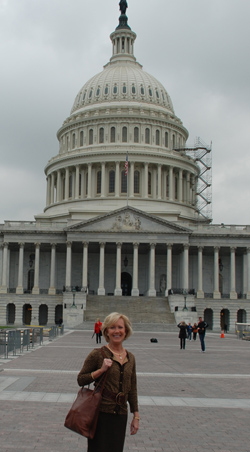Breaking Down Our Artificial Walls
Print This Post In communities across the country, innovative leaders are coming together to make children our top priority. Ready by 21 (RB21) is an unprecedented coalition of prominent national organizations whose members touch the lives of more than 100 million children and youth.
In communities across the country, innovative leaders are coming together to make children our top priority. Ready by 21 (RB21) is an unprecedented coalition of prominent national organizations whose members touch the lives of more than 100 million children and youth.
We’ve been invited into national partnership to explore ways of working with the RB21 coalition, an independent entity that promotes federal policy principles around four core themes: Bigger Goals, Bolder Strategies, Better Data, and Broader Partnerships.
I recently joined Forum for Youth Investment and leaders from Chattanooga and Nashville at a Congressional lunch briefing in Washington to talk about our model local partnerships to ensure that all youth are ready to succeed in college, work, and life, and how federal policy can support and expand the most promising efforts.
Given our 20 years of experience in community-based collaboration, which we know works in improving outcomes for children and families, I find RB21’s framework and tools particularly helpful in our work.
I told Congressional staffers that our challenge is to stay focused on the fact that children grow up in families who live in communities. That’s why we need a continuum of services, supports, and opportunities from birth to adulthood to ensure that critical transitions in the lives of children are successful, and that every member in the community recognizes his or her role in achieving that.
The strong, vibrant communities we seek cannot be accomplished by a single entity or program. RB21 can help steer away from that silver bullet mentality. We need a cohesive system.
Federal opportunities that allow for more comprehensive strategies—and that support and promote cross-agency work and coordination—are significant motivators for communities.
When evidence-based practices are encouraged and required, time and resources are better utilized because communities aren’t constantly trying to reinvent the wheel. A comprehensive strategy reaching more children can get off the ground a lot faster with a higher likelihood of success in communities where the local collaborative infrastructure is recognized and utilized, rather than creating new partnerships for every new initiative.
Across Georgia, Family Connection has successfully implemented healthy start, even start, early learning opportunities, drug-free communities, and communities of care—not as stand-alone programs—but in the context of an ongoing effort to focus on each collaborative organization’s highest priority local need and to implement effective responses.
If evidence-based practice is required, then by definition, it has been proven, so our priority must be to quickly get the practice into the direct service provider community, and then sustain it. RB21 recognizes that.
Going to scale and replicating best practices must become the focus of our work.
One of the most important lessons we’ve learned in the past two decades is how critical it is to connect community priority and experience to state and national partners though intentional dialog. That is what informs planning and development at all levels.
Those closest to the community, and to the children and families they know best, develop the most creative, successful, and sustainable solutions. Our state and federal partners should seek ways to encourage and support that through technical assistance and by allowing local decision-making and control.
It is vital that you share your efforts to collaborate with your public and private partners in your county to ensure that federal resources are being used and leveraged to support children and youth. We’d love to hear about the lessons you’ve learned, and about your most creative, successful, and sustainable solutions.
